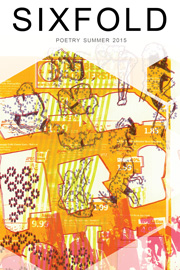
Poetry Summer 2015 fiction all issues

whitespacefiller
Cover Hannah Lansburgh
Jennifer Leigh Stevenson
For Your Own Good
& other poems
Marianne S. Johnson
Tortious
& other poems
Kate Magill
Nest Study #1
& other poems
Karen Kraco
Studio
& other poems
Matt Daly
Beneath Your Bark
& other poems
Paulette Guerin
Emergence
& other poems
Hank Hudepohl
Crossed Words
& other poems
Alma Eppchez
At the Back of the Road Atlas
& other poems
Jim Burrows
At the Megachurch
& other poems
Rachel Stolzman Gullo
Lioness
& other poems
Yana Lyandres
New York Transplant
& other poems
Heather Katzoff
Start
& other poems
Tom Yori
Cana
& other poems
Barth Landor
What Is Left
& other poems
Abigail F. Taylor
Never So Still
& other poems
George Longenecker
Polar Bears Drowning
& other poems
Ben Cromwell
Sometimes a Flock of Birds
& other poems
Robert Mammano
the way the ground shakes
& other poems
Janet Smith
Rocket Ship
& other poems
Gina Loring
Dementia
& other poems
J. Lee Strickland
Minoan Elegy
& other poems
Toni Hanner
Catching the Baby
& other poems
Abigail F. Taylor
Never So Still
See this wire-boned boy climbing
to the mangoes? Papi below
sings—Oh Dusty Venezuela!
Picked fruit falls to his blistered feet.
He bites into it, peel and all.
Ruben eats in the tree. Sublime
juice tickles his wrists. He, aglow
with Papi’s New World tales, clumsy
in an old half-toothed mouth, retreats
to dreams: America! Baseball!
Papi taught him this, to throw fast
and hard. To love equally so.
Ruben, at sixteen, poor, tired,
and yearning, sent to shore to play
the game. To honor frail Papi,
who died between his first and last
crash into home plate. There were low
years when he fought to inspire
the song of himself in bad ways,
and listless days were choppy
with old promises. Then Ruben
swallowed up his grandfather’s soul,
became that man of effortless
joy. And he loved so vibrantly.
He had a son and was happy.
I met him in the taste of sin.
His cross pressed to my breasts. His bold
grin and my paid for recklessness.
I miss our spare talks, privately
passed like school notes, that were sadly
never enough.
At Ruben’s wake, his son sat quiet
and lonely in the front pew. He
marveled at the rosary breathed
into his father. I wanted
to say, he was never so still.
While the Streetlamp Listened
She took
his callow face
and tipped it, nearly kissed
in the sacred glow of night. But
dawn came.
And he
felt her age press
into forbidden fruit
and her husk of wine-dark hair. The
lark sang.
Wichita Falls
Can you remember dawn’s dreary mist
as it curled and settled into the trees?
Autumn had a peculiar way of falling before leaves.
There are no loons on this side of the world,
but I think of their hallowed calls
fighting against a separate, peaceful cold.
She had paid for a cabin far off the road;
a hope of stitching back together a loveless
marriage she herself had caused to unfold.
But you and I found comfort in pitching camp
beneath a dripping candled moon.
Do you think that he returned to her arms
that night, their faithless kissing as joined up writing
or like that morning mist hugging brittle bark?
Perhaps they stayed as distant as the loons.
Either way, we woke with dawn.
Our dog, the only one to grin at such an hour,
rutted through pine needles, then leaped
into the thicket, while wind chimes
took on the beat of unseen hooves.
We, as children, were never allowed to stray.
It was the duty of grownups to strangle themselves
in the undergrowth of wayward passions.
Still, we followed the dog.
Despite the light, all of it slept:
The brambles. The hollied hill. The pale red robin.
Only the beck spoke over moss and stone.
We found the dog laying at the water in lazy company.
These fawns and young bucks, not quite into their points,
drank with caution.
As we called out, our echoes shepherded the deer
to distant corners, while the dog bounded to us
and licked flashes of bare skin.
He took a way back to the dark cabin
beyond the trees.
You pressed last night’s coals to new tinder
and we tried to scramble eggs on a dry skillet.
A good fire had been made by your hands,
but breakfast turned brown, improved only
by a dashing of salt and the clear air.
He stepped onto the closed off deck.
His eyes blank against the breeze,
so remarkably outside the man we knew.
He saw us and dissolved into a familiar face,
then returned inside to prepare something better
than what we had eaten.
Do you remember how we spoke like this was home?
Our souls slumbered there with cold pine and warm fire.
We understood the dog’s contentment to roll in sweet mud,
follow the deer, and ignore the shrillness of women in winter.
At peace in the wandering.
And you told me the cabin had a design like jazz.
Frozen in marrow. Harsh and vibrant.
Had I known then how to tell you the rhythm of this wood,
I would have shared everything.
Abigail F. Taylor is a North Texas Poet published in Illya’s Honey, Red River Review, and Sixfold. She worked as the script editor and assistant director to Raptor Ranch, a gore-comedy now known as The Dinosaur Experiment. You can visit her on the web: http://wordpirate.webs.com
is a North Texas Poet published in Illya’s Honey, Red River Review, and Sixfold. She worked as the script editor and assistant director to Raptor Ranch, a gore-comedy now known as The Dinosaur Experiment. You can visit her on the web: http://wordpirate.webs.com